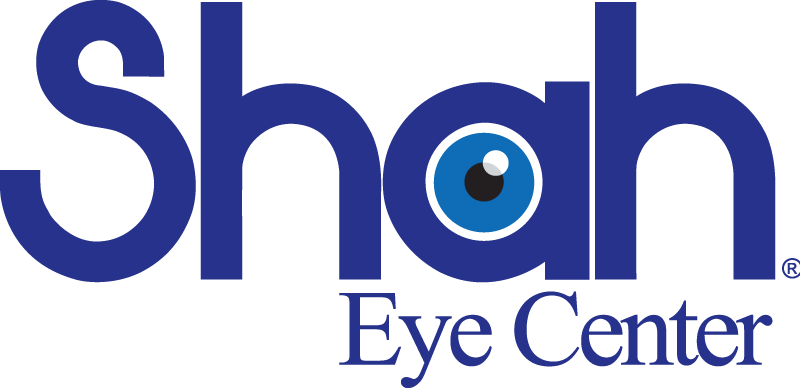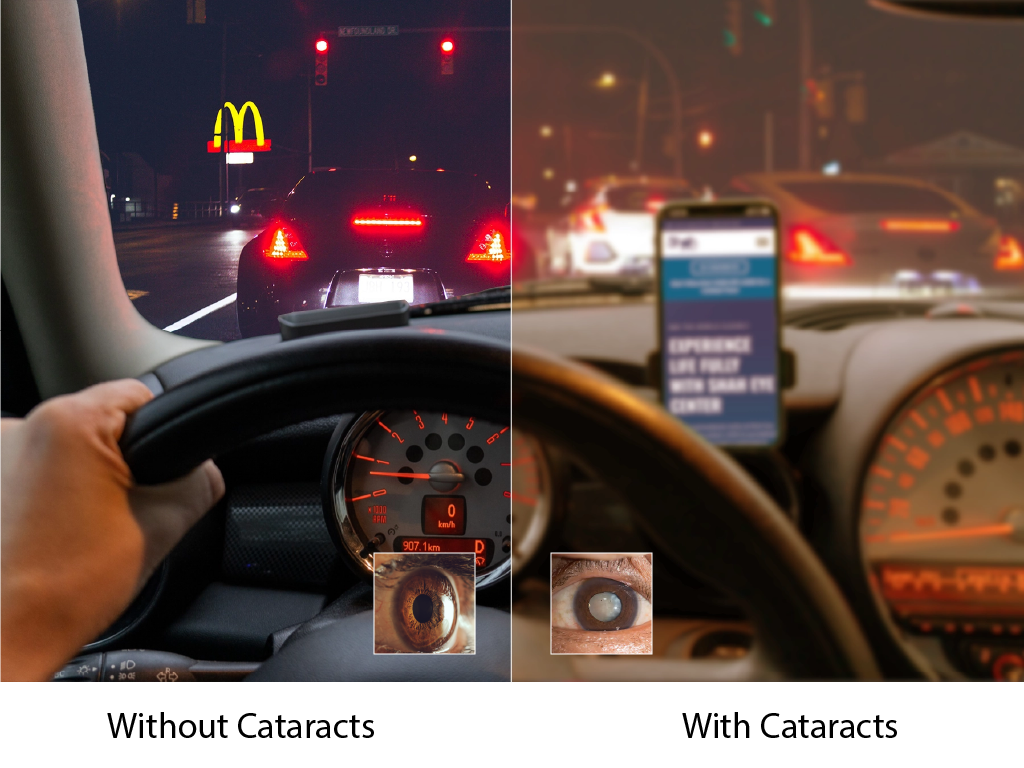What Is a Cataract?
A cataract occurs when the natural lens inside your eye becomes cloudy. Normally, the lens is clear and helps focus light on the retina so you can see crisp, vibrant images. As we age, the proteins in the lens can break down, causing the lens to lose clarity. This leads to blurry, hazy, or faded vision — much like looking through a foggy window.
Common Symptoms of Cataracts
Cataracts tend to develop gradually, and many people don’t notice early symptoms. As the condition progresses, you may experience:
- Blurry or dim vision
- Double or “ghosted” images in one eye
- Increased sensitivity to light or glare
- Difficulty seeing at night or needing brighter light to read
- Colors appearing faded or yellowed
If you notice these symptoms, schedule a comprehensive eye exam with Shah Eye Center. Early detection can help preserve your vision and guide your treatment options.
Alt Text: Example of cloudy or blurry vision caused by cataracts.
What Causes Cataracts?
The most common cause of cataracts is aging. Beginning around age 40, the proteins in your lens naturally start to break down. Most people over 60 experience some degree of lens clouding, though vision changes may take time to appear.
Other risk factors include:
- Family history of cataracts
- Medical conditions such as diabetes
- Previous eye injuries or surgeries
- Prolonged sun exposure without UV protection
- Long-term use of steroid medications
- Smoking
To help slow cataract development, wear sunglasses that block 99% of UV rays, manage chronic health issues, and avoid smoking.
Alt Text: Person wearing UV-protection sunglasses to prevent cataracts.
How Cataracts Are Diagnosed
Cataracts are diagnosed through a comprehensive eye exam performed by your ophthalmologist. This exam includes dilation and several tests to evaluate your eye health:
- Slit-lamp exam: Provides a detailed view of the cornea, iris, and lens.
- Retinal exam: Allows the doctor to examine the retina and optic nerve for cataracts or other conditions.
- Visual acuity test: Measures the clarity of your vision with an eye chart.
At Shah Eye Center, our doctors use advanced diagnostic technology to ensure accurate detection and personalized treatment recommendations.
Alt Text: Ophthalmologist performing slit-lamp eye exam to diagnose cataracts.
Living With Cataracts
If your cataracts are mild, you might not need surgery right away. Adjusting your eyeglass prescription, improving lighting, or using magnifying lenses can help you manage daily activities comfortably.
Here are some practical tips to maintain good vision:
- Wear sunglasses and wide-brimmed hats outdoors
- Use brighter lights when reading
- Avoid night driving if glare interferes with vision
- Keep chronic conditions like diabetes under control
Cataract Surgery: Safe, Quick, and Effective
When cataracts begin to affect your lifestyle — making it hard to read, drive, or recognize faces — it may be time to consider cataract surgery.
During this safe and common procedure, your surgeon removes the cloudy lens and replaces it with a clear, artificial intraocular lens (IOL). This restores sharp, bright vision and can reduce your need for glasses.
At Shah Eye Center, our experienced surgeons perform cataract surgery with advanced technology to ensure comfort, precision, and excellent results.
Alt Text: Illustration showing replacement of cloudy lens with intraocular lens during cataract surgery.
Sometimes, vision may become hazy again years later due to clouding of the capsule that holds the new lens. This can easily be corrected with a quick, painless laser procedure called a capsulotomy.
Clear Vision Starts at Shah Eye Center
Cataracts are common — but they don’t have to hold you back. At Shah Eye Center, we’re proud to help patients in Mission, McAllen, Weslaco, Brownsville, and Rio Grande City, TX see life clearly again.
???? Schedule your comprehensive cataract consultation today!
???? Call (956) 583-0202 or visit shaheyecenter.com to book your appointment online.

